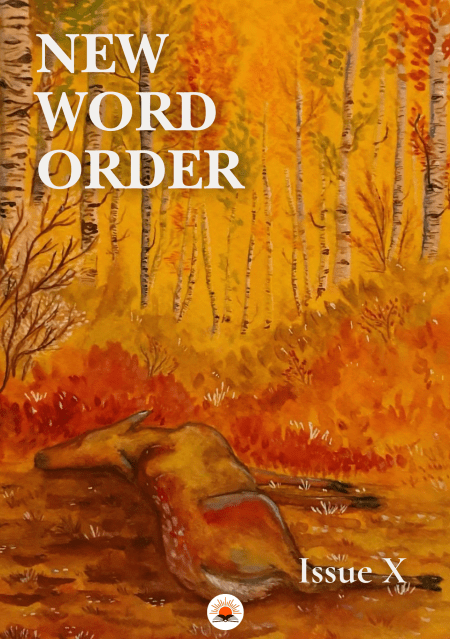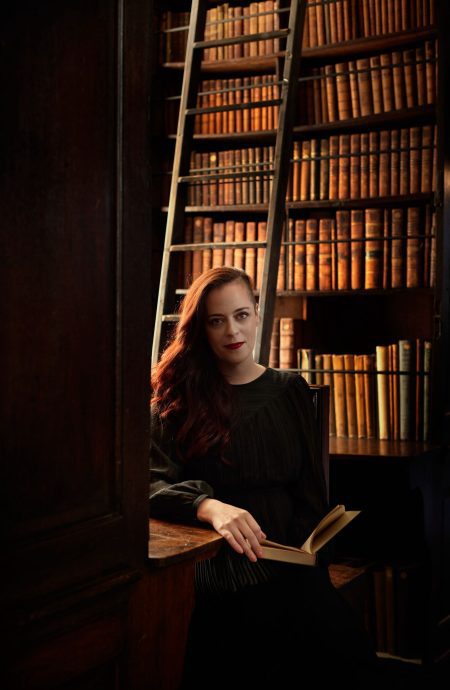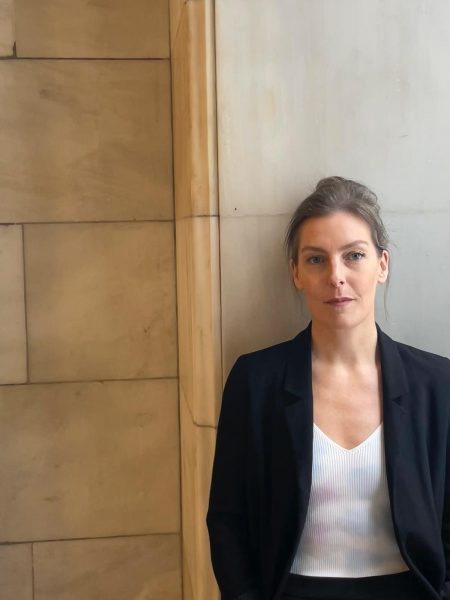by Cassie Smith-Christmas, she/her
The boy knows who they are, though he’s never seen them before. He stands at the crest of the hill, watching their feet slough along the muddied road. The marshes stretch icy on either side: flat and grey, save for blisters of dead grass here and there. The sky too is grey, the air swollen with the promise of snow. One of them collapses and the boy watches the man’s body writhe in the mud. Then the man stumbles to his feet, his white robes stained with the dregs of a long winter.
Father has said many times they’re heretics, these men. They go from town to town, mortifying their flesh. They think they’re doing the Right Thing, that God will rain down his forgiveness and end this plague. But Father also states that God will not be swayed so cheaply by their meagre bits of flesh.
They have begun to chant. The boy closes his eyes and tightens his arms around the kindling he holds to his chest. He tries to understand the words, but he can’t make out many. Domine, of course, but everyone knows that. When he opens his eyes he sees that they have almost reached the copse. From here they will go into town and start their ritual. They will probably sleep in the church tonight; he wonders if they will sleep on their backs or on their stomachs, if they will wash each other’s wounds with water, or if that would lessen the penitence. In any case, they will leave the next day, heading in the direction the sun sets each day. Never to be seen again.
A clatter of wings. A crow rises from the branches above. The boy watches its black body plane across the marshes and blend into the sky. The kindling grows heavy in his arms. He starts down the hill, taking the long way instead of the path that leads straight down. Snowflakes hover like moths in the air. He takes his time, feeling the quiet gather around him.
When he gets to the small clearing at the bottom of the hill, he stops and takes a few deep breaths. Lets the tight feeling pass over his body. Sometimes he allows it to rise in a sob, but not today. He should get back; Father will need the kindling soon. Yet he stands for a moment longer. The clearing and the cottage tucked away at the back are the same as yesterday: the thatched roof balding in places, the earth scraped bare where vegetables used to grow. The well probably frozen or dry now一it was summer when the bucket was last pulled up.
He walks past the cottage because if he goes in, he’ll remember. He’ll see the grotesque knots that grew at his father’s armpit, at the side of his mother’s neck. The darkness at the tips of their fingers and noses like the skin of a bruised apple. He knew of course, though never said it. Saying it would make it real. And while his parents were still alive, he could pretend it was just a fever. The blackness would disappear and everything would go back to normal.
But it didn’t. The day he buried them had been hot, and it had taken nearly all afternoon, digging with his little spade. Slow, too, pulling their bodies towards the beech tree. Sliding them into the two hollows of earth. Piling the soil on top, the soil growing warm. Strands of sunshine among the beech leaves, the light swelling and receding, swelling and receding again until it grew soft and clouded. There was a murmur of owls; the moon like the white clean curve of a fingernail; and stars, poking through empty space in the branches. The boy lay down and fell asleep, there between his parents.
The day after, he went straight to the church. Father was on the steps, face bright in the sun . The boy told him how he had buried his parents, and Father had looked at him for a long moment. Father put his hand on the boy’s head and said he had done the right thing, the graveyard had long overflowed. Then he intoned, “God has spared you. Now you’ll live with me and the others, in God’s home. We’ll serve Him each and every day.”
He held out his hand. The boy took it, following Father into the church. It became his home, and although the hollow inside him wouldn’t go away, he knew Father was trying to fill it. Asking him to gather firewood. Teaching him new words so he could say them along with the others. Always seeing that his bowl of porridge was filled to the brim. And so the boy never told Father how he came here most days, for he knew it would make Father sad.
The snow is heavier now. It speckles the two mounds of earth that lie underneath bare branches. The boy sets the kindling down. He kneels and kisses the ground over his mother. The snow is cold against his lips but he stays a moment, body bent over the mound. Then he kisses the earth on his father. It doesn’t matter which one is first; some days it is one, some days the other. Things like that don’t matter to the boy anymore.
He stands. He looks up into the branches overhead, and realises they aren’t completely bare after all; little drops of green burst up here and there. The boy picks up the kindling and walks away.
***
It isn’t long before the trees start thinning and he finds himself in the square outside the church. They have formed a circle; townspeople hover at the fringes, but no one dares go too close. The snow falls harder. The chanting grows greater. The flagellants peel their robes down to the waist, exposing the dried blood of their backs to the sky, to the dark clouds, to God above. The boy can’t seem to look away.
The chanting stops. Someone coughs. A snow-hush has gathered, and the sound of whip meeting flesh rings out. They start to move in a circle, scourging their skin, the black of old blood mixing with bright new blood. One of them starts singing a hymn and others join in. At first the boy wants to join in, too, but then he wants nothing more than to drop the bundle from his arms and cover his ears with his hands. To block out the noise, the sight, all of it. For none of this to have ever happened, for things to go back to normal.
But he keeps watching. Snow swirls in the sky and he imagines the snowflakes meeting their backs, melting with the warmth of their blood. They continue; it has become a rhythm, a swell. The steady thwack and the shuffle of feet. Thwack shuffle shuffle. Thwack shuffle shuffle. He wishes Father were here to lead him to the church, sit him by the fire and help him forget what he has just seen.
They stop. They fall to their knees, arms outstretched as if they were Christ, splayed on the cross. Some of their faces contort into strange shapes. The crowd is still. Snow falls like ash around them.
The flagellants stand up. They begin to file towards the church.
The boy notices him at first because he is the only one whose back is bright red. All new blood, no dark scabs like the others. Then he looks at the face, at the tears gathered in the corners of his eyes.
“Father!” the boy cries out.
At first, Father does not even turn his head. He keeps his eyes on the mottled body of the man in front of him.
“Father!”
Finally, Father looks in the boy’s direction. He stops, letting the other flagellants pass by, their heads bowed and their eyes cast down. Then he forces a smile. “My child, I see you’ve brought the kindling.”
“But Father, you said-you said…” The boy can’t bring himself to finish the sentence.
“I know my child. I know what I’ve said. But God has spoken to me. And I must join these men. This is the way of the Lord.”
“I don’t understand…”
“Sometimes we don’t understand. Only the Lord is all-knowing. We must have faith in Him.”
“But Father, where will I go now?”
“The others will take care of you. You’ll always have a home here. Now, goodbye, my child. May the Lord bless you and keep you.”
The boy stands there. He watches as the flagellants file into the church. He thinks of the porridge they’ll eat, of how he stirred it earlier. How they’ll warm themselves by the fire, the fire he has brought kindling to feed. How tomorrow the flagellants will leave this place as if it never existed at all. And go onto the next town. And then another. Ad infinitum.
The townspeople are drifting away. Soon he is the only one left in the square. He tilts his head up. A bird crosses the sky overhead, towards the east.
The boy presses the kindling to his chest. He turns towards the trees, and starts walking home.


